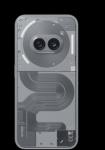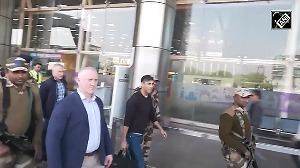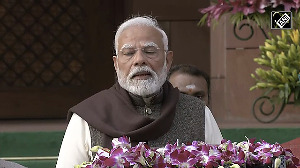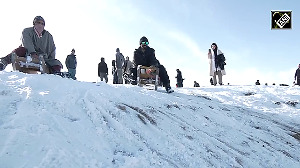The much-awaited judgement in the 1993 serial bomb blasts case, in which actor Sanjay Dutt is among the 123 accused, will be pronounced on September 12 by a Terrorists and Disruptive Activities (Prevention) Act Court that began dictating its verdict on Thursday.
All the accused were present in the makeshift court within the Central Jail at Arthur Road in central Mumbai when Judge P D Kode said he would deliver the verdict on September 12.
A series of 13 powerful blasts had ripped through the city on March 12, 1993, killing 257 people and injured 713.
The accused waited anxiously in the dock as the judge heard arguments from prosecution and defence lawyers before stating he would give his verdict next month.
As the court assembled, the names of the accused were called out and their attendence taken.
Defence lawyer Farhana Shah objected to the court going ahead with the dictation of its verdict, saying accused Abu Salem had filed a petition in Bombay High Court, challenging the TADA court's order separating his trial from that of the other accused. The matter was posted for August 14, she told the court.
Strongly opposing her plea, prosecutor Ujjwal Nikam pointed out the high court had not stayed the TADA court's order in this matter. The TADA court could therefore go ahead with the dictation of its verdict, he argued.
Accepting Nikam's argument, Judge Kode decided to go ahead with dictating his judgement.
Security was beefed up in the court and its vicinity with the accused, lawyers and journalists having to undergo a thorough check before entering the premises.
Police clamped prohibitory orders under Section 144 of the CrPC, banning the assembly of five or more persons in the area surrounding the court.
Altogether 198 accused were roped in the case by the Central Bureau of Investigation in 1993 soon after the blasts. Of these, 29 were discharged due to lack of evidence and 29 others, including prime accused Dawood Ibrahim, Tiger Memon and Mohammed Dossa, were shown as absconding.
Of the remaining 140 accused, 11 died during the trial while two others, Abu Asim Azmi and Amjad Mehr Baksh were discharged by Supreme Court. Another accused, Riaz Khatri jumped bail on September 23, 1996, and is absconding.
The trial of three more accused, Abu Salem, Riaz Siddiqui and Mustaffa Dossa has been separated leaving 123 accused to face the trial in the main case, according to special Public Prosecutor Ujjwal Nikam.
A series of explosions rocked 13 places in Mumbai on March 12, 1993, and property worth Rs 27 crores was destroyed in the blasts.
The blasts were masterminded by underworld don Dawood Ibrahim with the help of his lieutenants Tiger Memon and Mohammed Dossa, allegedly at the instance of Pakistan's intelligence agency, Inter Security Intelligence, to avenge the demolition of disputed Babri Masjid, the CBI has said in the chargesheet.
According to CBI, the perpetrators of the serial blasts intended to shatter the country's economy, as was indicative from the selection of blasts sites namely Bombay Stock Exchange, Air-India building, hotel Sea Rock, hotel Centaur Juhu, hotel Centaur Airport, and in busy areas of Zaveri Bazaar, Katha Bazaar and Century Bazaar.
A petrol pump near the Shiv Sena Bhavan and Plaza theatre were also targeted as blasts killed many people.
As part of the conspiracy, hand grenades were hurled at a Hindu colony in Mahim, triggering riots in Mumbai in which several motor vehicles, shops and houses were damaged.
Hand grenades were also hurled at the airport, but no damage was caused, while RDX-stuffed scooters that had failed to explode were seized from Naigaon and Dhanji Street.
The explosions occurred between 1:30 pm to 3:40 pm on a Friday sending shockwaves among the people across the country.
The arms and ammunition used in the blasts arrived by a ship from Pakistan at Shekadi and Dighi coasts in Raigad district during January-February 1993.
Dawood, Memon and Dossa are absconding accused in the list of 29. While Dawood was already abroad when the blasts occurred, Memon and Dosa fled a day before.
The conspiracy meetings were held in Mumbai, Dubai and Panvel in Raigad district. 25 accused were sent to Pakistan via Dubai for arms training and learning skills to make bombs, CBI has said.
Some accused were asked to arrange landing of arms and ammunition at Raigad coast, while others were given the job of distributing the weapons and explosives to co-accused, CBI said.
The first witness to step into the box was accused-turned approver Mohammed Khatlab who disclosed the conspiracy saying he was lured by accused Farooq Motorwala to attend a meeting in Dubai called by Tiger Memon.
He visited Dubai and also went to Pakistan, but returned without taking arms training on the pretext of ill-health.
The second witness was also an approver, Mohammed Usman Jan Khan and he had said he was involved in every stage of the conspiracy -- attending meetings, participating in arms training and bomb-making in Pakistan, stuffing RDX in cars and scooters and parking the vehicles in targeted places.
Khan identified 33 accused in the court as the members of Tiger Memon team who had helped in executing the blasts.
A day before the blasts RDX was stuffed in the boots of cars and scooters in the garages of Al-Husseini building where Tiger Memon and his family own four flats.
Among the accused were customs officers, including S N Thapa, who were arrested and dismissed from service on the charge of helping Tiger Memon in getting away with explosives despite an intelligence alert in this regard.
Others were police officers who had allowed the consignment to pass in vehicles although they took the defence that they contained silver bricks and not RDX.
Actor Sanjay Dutt also found himself in the dock with the allegation that he had accepted an AK-56 rifle from Abu Salem, Baba Musa Chavan, Samir Hingora and Hanif Kadawala.
With PTI inputs






 © 2025
© 2025